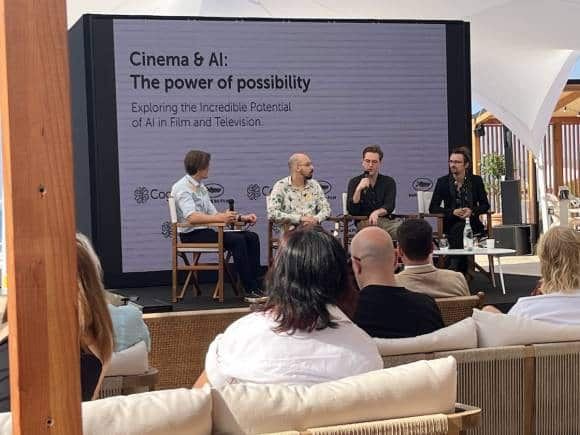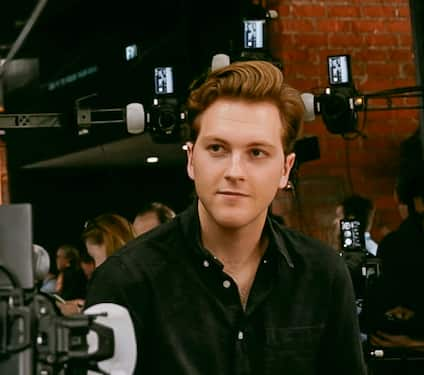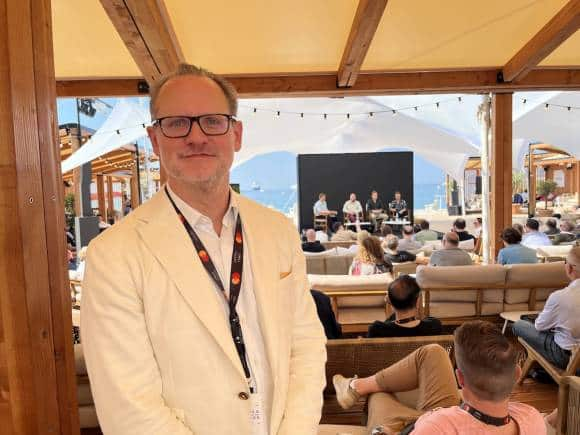



In the middle of his speech on the power of possibilities of Artificial Intelligence (AI) in cinema at the Cannes Film Festival this week, Los Angeles-based documentary director Quinn Halleck paused to introduce the trailer of his newest movie, curiously named ./sigma_001.
The short film about an engineer at a major tech company in the US sneaking a skeptical journalist into an interview with the first sentient AI is made by the first AI filmmaker in the world, named Satori-5. The brainchild of Halleck, Satori-5 is designed to explore the intersection of technology, storytelling and filmmaking with the goal of pushing the boundaries of cinema.
The film, ./sigma_001, is set for an online release in July in three parts of five minutes each. The film’s trailer premiered earlier this week at the Cannes Film Festival’s Marché du Film, the world’s oldest and biggest such film market, at a seminar on AI, titled “Cinema & AI: The Power of Possibility”.
 Leading AI practitioners and startups were present at a seminar on AI in Cinema and the Cannes Film Market this week.
Leading AI practitioners and startups were present at a seminar on AI in Cinema and the Cannes Film Market this week.“There are news tools emerging daily that help further the use of AI in the creative process,” says Halleck, who has worked with Armageddon, Transformers and Pearl Harbour director-producer Michael Bay in the Ryan Reynolds-starrer 6 Underground and Jake Gyllenhall-starring Ambulance.
Halleck's film, ./sigma_001, utilises AI in every stage of its production process, from ideation to VFX to distribution, marking a significant step towards the integration of AI into traditional creative workflows. Filmmaker Satori-5 is poised to continue to experiment and refine new techniques with, what Halleck believes, the ultimate goal of empowering storytellers to do more with less.
The current tools available for AI in cinema are many, like ChatGPT for ideation and storytelling, Stable Diffusion for concept art and storyboarding, Runway for masking, Eleven Labs for audio manipulation and Flawless Ai for language adaptation. “Not everything is currently open source, but it’s important for a lot of these companies to consider doing so because of the speed in which AI is developing,” explains Halleck.
Many practitioners in the nascent AI in cinema initiative are certain Satori-5 is just the beginning where the technological intervention is going to spring up incredible opportunities in content creation, production, exhibition and consumption in the global entertainment industry.
 Los Angeles-based documentary director Quinn Halleck says AI is the tool for filmmaking to be more relevant today.
Los Angeles-based documentary director Quinn Halleck says AI is the tool for filmmaking to be more relevant today.The first step in this direction points to unleashing the power of creativity within AI. For example, AI can alter shot details like backdrop and colour to suit the scene. AI-assisted content creation can also help rethink and reallocate resources to make the production process faster, better and cheaper.
“During the French New Wave cameras became smaller, helping filmmakers go into the streets to create a new cinematic language,” says filmmaker Mathias Chelebourg, CEO of the Paris-based Atelier Daruma, an innovation studio and motion capture stage based crafting immersive storytelling, interactive art and multi-sensory experiences in cinema. “Today, technology like AI, is the tool to be more relevant,” he adds.
At the Cannes film market, several leading AI companies, including Stability AI, which last year released the text-to-image model Stable Diffusion, Metaphysic AI, the startup known for its work on deep fakes, were present. “We aim to inspire filmmakers to embrace the transformative power of generative AI, allowing them to unleash their creativity and revolutionise the film industry,” says Stability AI founder Emad Mostaque.
Metaphysic AI is the official generative AI partner for the forthcoming film, Here, starring Tom Hanks and Robin Wright and based on American author Richard McGuire’s graphic novel by the same title. “Here will be the first example of extensive use of AI generated content that drives the storytelling of the film,” says Metaphysic AI CEO Tom Graham.
Tech researchers and artists are now hanging out in platforms like the AI community building Hugging Face creative workflow space to build a new language for cinema in the future. If VFX defined cinema in the last decade, the next decade is expected to belong to a new generation of filmmakers using AI. “It is hard to forecast the future,” says Chelebourg, who expects production companies to hire AI specialists in their teams.
In September this year, the O2 arena in London will witness the world’s largest AI event attended by 4,000 influential leaders to address the question, How do we get the next ten years right? The speakers include actors Robert Downey Jr. and Matthew McConaughey, former US Secretary of State John Kerry, DeepMind CEO Lila Ibrahim, Atlas of AI author Kate Crawford, and Rolls Royce CEO Warren East.
“We are planning three more large AI festivals in Asia, America and the Middle East,” says Charlie Muirhead, CEO of R&D company CogX, which is organising the London O2 event. "The next destination will be India,” adds Muirhead.
 London-based R & D company CogX's CEO Charlie Muirhead.
London-based R & D company CogX's CEO Charlie Muirhead.AI experts are aware the world is watching each step with caution. Many have raised questions on labour, creativity, consciousness and ethics related to machine-generated content. “As a society, it’s important we embrace these new tools intelligently and look at how AI can amplify artists rather than dismantle them,” says Halleck.
In Halleck-directed ./sigma_001, made by his production studio Late Arrivals, he began with a real story, but will ask ChatGPT questions like what was the first job of a particular character. The movie was shot in February this year with real actors at real locations.
Amassing an extensive knowledge of film history and genres, Satori-5, which is takes its name from the Japanese term for enlightenment, is a metaphorical representation of AI that can generate script ideas, storyboards, concept art, visual effects and shot lists as well as provide insights and suggestions throughout the production and post-production workflows. The AI filmmaker possesses a vast knowledge base, encompassing film history, genres, cultural references and audience preferences that help shape narratives.

Discover the latest Business News, Sensex, and Nifty updates. Obtain Personal Finance insights, tax queries, and expert opinions on Moneycontrol or download the Moneycontrol App to stay updated!
Find the best of Al News in one place, specially curated for you every weekend.
Stay on top of the latest tech trends and biggest startup news.